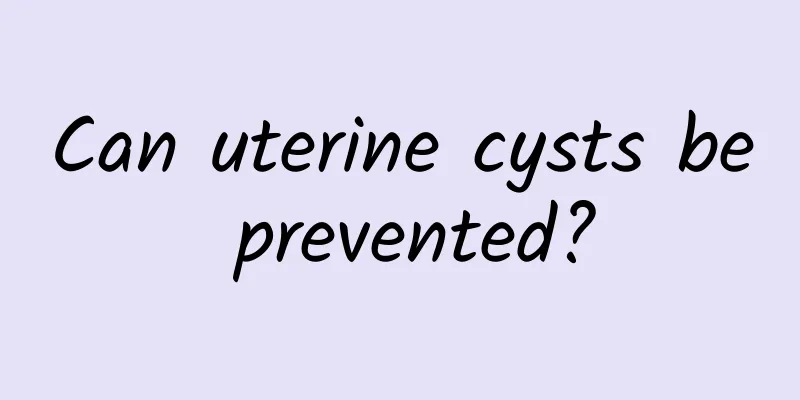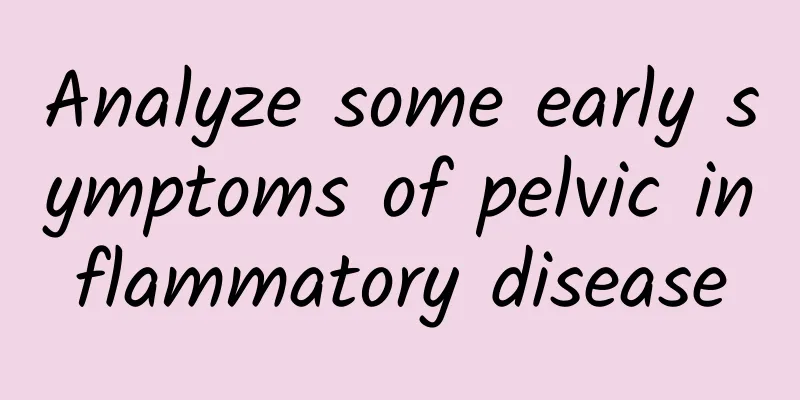Can uterine cysts be prevented?

|
Uterine cysts can be prevented by paying attention to lifestyle, regular physical examinations, and reducing risk factors, but their occurrence cannot be completely avoided. Although the formation of some cysts is related to genetics or uncontrollable factors, the risk of disease can be effectively reduced through scientific management. There are many reasons for the formation of uterine cysts, including pathological factors such as hormonal imbalance, chronic inflammation or infection, and endometriosis. Genetic predisposition may increase the probability of disease, but environmental factors and physiological conditions also play an important role. For example, excessive stress in life and irregular work and rest may lead to endocrine disorders, which in turn increase the possibility of cysts. Long-term use of high-dose contraceptives and repeated intrauterine operations (such as abortion surgery) are also common causes. If the cyst is small or asymptomatic, no treatment is required in most cases, but in the case of enlarged cysts, accompanied by pain or abnormal menstruation, it is recommended to take targeted treatment according to the condition, such as drug regulation of hormones (common drugs include dienogest, medroxyprogesterone acetate, etc.), injection of gonadotropin-releasing hormone agonists, or surgery (such as open cyst removal or laparoscopic surgery). In order to effectively prevent uterine cysts, women should maintain a regular schedule, avoid staying up late, reduce the intake of high-fat and high-sugar foods, increase fiber-rich foods such as whole-wheat products, vegetables and fruits, and exercise regularly to help regulate hormone levels. Regular gynecological examinations are an important means of early detection and prevention of cysts. It is recommended to have a gynecological ultrasound examination once a year, and pay attention to whether your menstrual cycle is abnormal. If you find any problems, you should consult a doctor in time. It is also very important to avoid the abuse of contraceptives, reduce the number of artificial abortions, and standardize the treatment of gynecological inflammation. Developing healthy living habits combined with regular physical examinations is the key to preventing uterine cysts. If you feel lower abdominal pain or find menstrual abnormalities, you should go to the hospital as soon as possible for timely treatment and prevention of possible development risks. |
<<: Will cervical adhesions occur in spontaneous complete abortion?
>>: What are the symptoms of pelvic effusion cystic mass
Recommend
What are the misunderstandings about the treatment of dysmenorrhea?
What are the misunderstandings about the treatmen...
Is low-cost abortion really low-cost?
Is low-cost abortion really low-cost? Then what i...
How to prevent pelvic inflammatory disease
How to prevent pelvic inflammatory disease? As on...
Some Common Causes of Pelvic Inflammatory Disease
In life, more and more people suffer from pelvic ...
What are the symptoms of right ovarian cyst?
What are the symptoms of right ovarian cyst and i...
Amenorrhea is the most common clinical manifestation of ectopic pregnancy after pregnancy
Many patients want to know the clinical manifesta...
Symptoms of different types of uterine fibroids vary
Uterine fibroids are a common benign tumor of the...
What factors will affect the time of yellow water flow after uterine curettage? Female friends should pay attention to these 3 factors that affect the time of yellow water flow.
After a uterine curettage, you will have yellow d...
Is endometrial thickening related to uterine fibroids?
Is endometrial thickening related to uterine fibr...
If you can’t lose weight by running, be careful that you may be suffering from muscle-less obesity!
[Key Points]: Why can’t I lose weight even though...
Women must pay attention to the causes of irregular menstruation in a timely manner
Irregular menstruation is a type of gynecological...
Will female cervical erosion heal itself? Five reasons can cause cervical erosion to be difficult to cure.
Cervical erosion can be said to be a gynecologica...
What nutrients does subserosal uterine fibroids lack? What medicine is good for subserosal uterine fibroids?
What nutrients are lacking for subserosal uterine...
Why does vaginal bleeding still occur after years of amenorrhea?
Why does vaginal bleeding still occur after years...
What are the precautions for painless abortion?
Painless abortion is a common artificial abortion...









